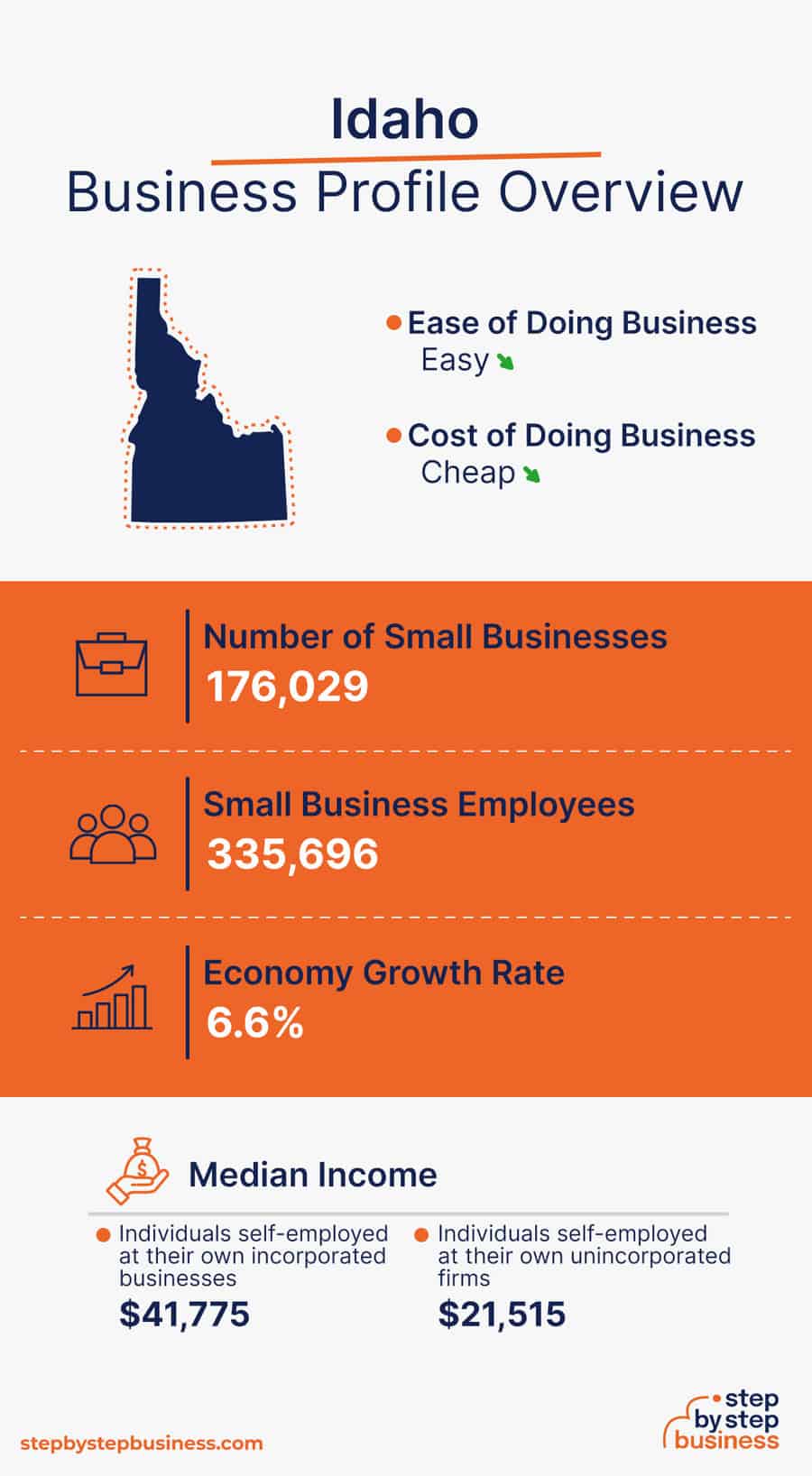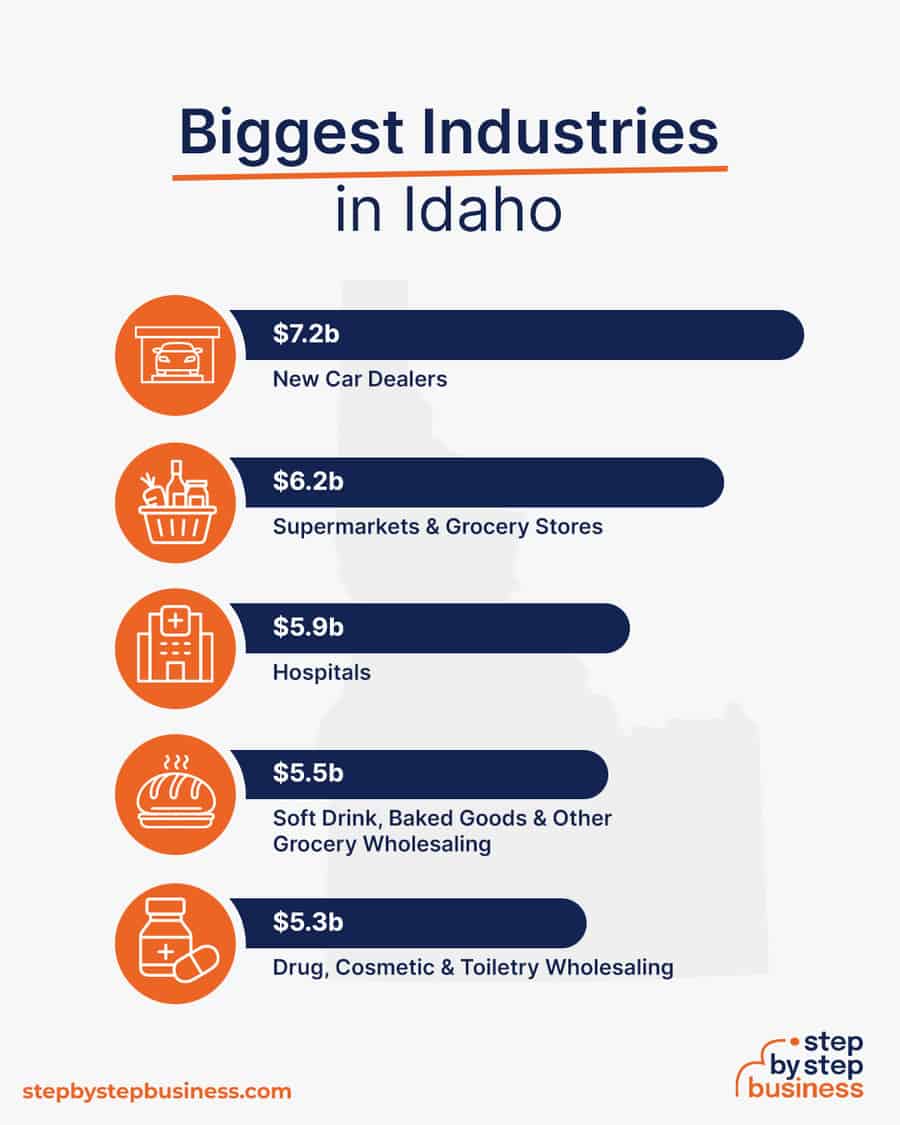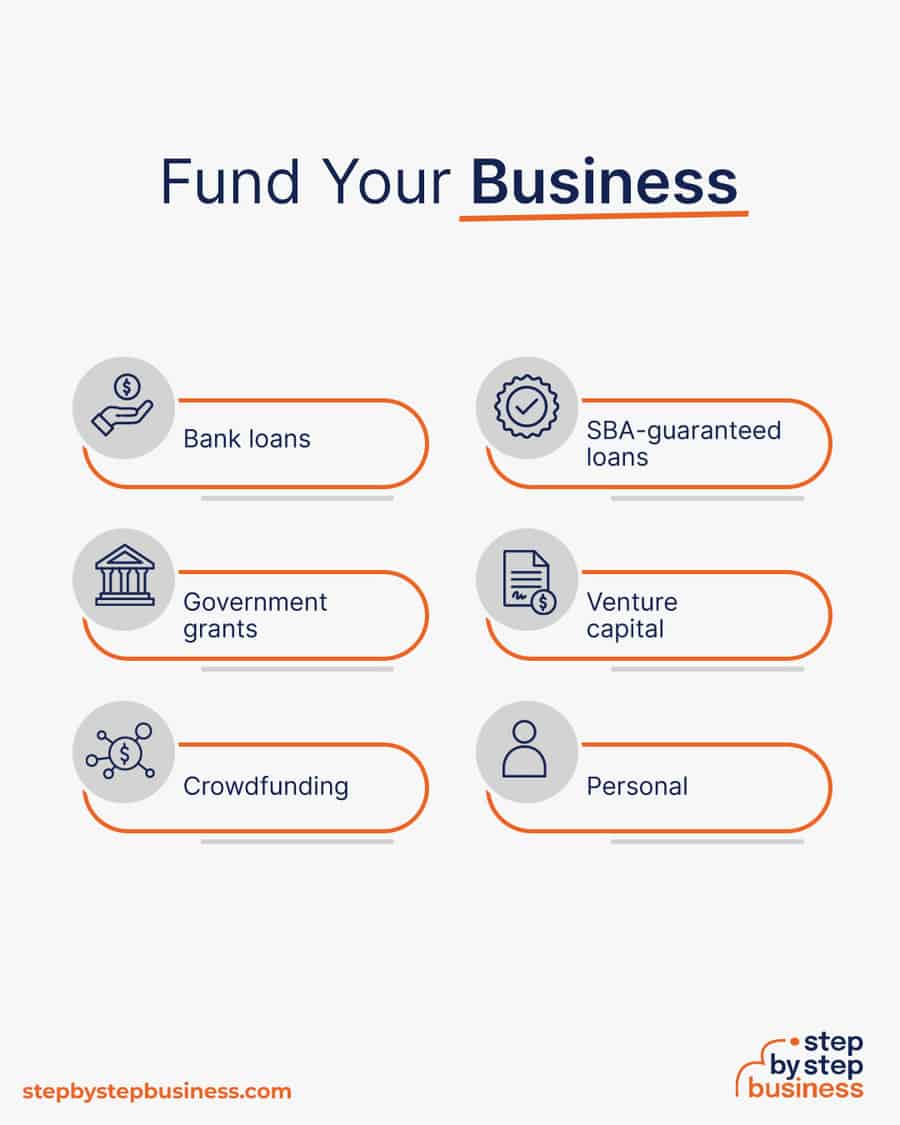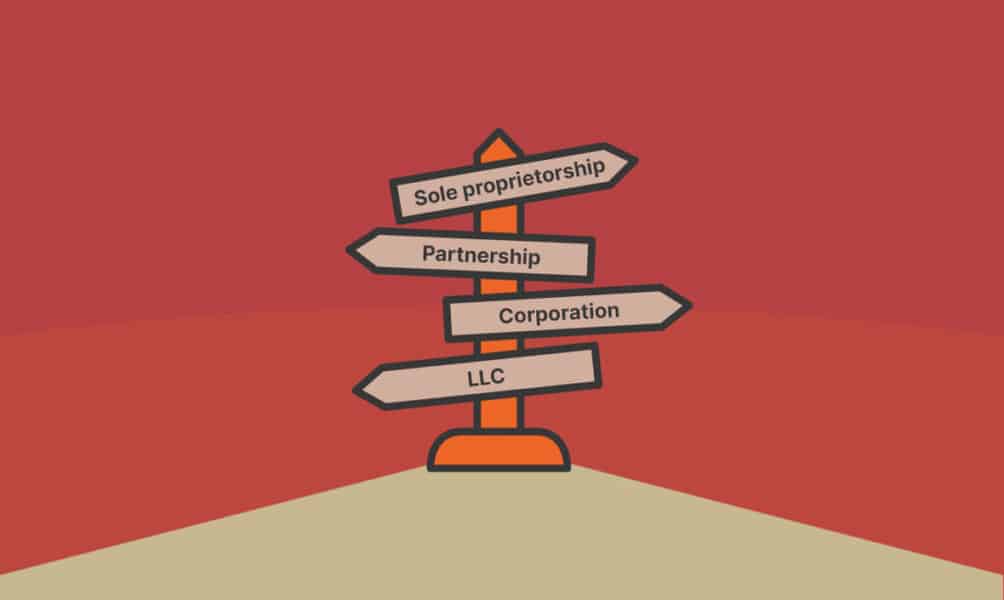Here are the steps you need to take to start a limited liability company (LLC) inIdaho: Choose a name for your Idaho LLC: Your business namemus ...
Idaho’s economic development website allows visitors to examine key districts of economic focus.
We earn commissions if you shop through the links below. Read more
Written by: Esther Strauss
Esther is a business strategist with over 20 years of experience as an entrepreneur, executive, educator, and management advisor.
Edited by: David Lepeska
David has been writing and learning about business, finance and globalization for a quarter-century, starting with a small New York consulting firm in the 1990s.
Published on September 2, 2021

With the eighth-lowest population density in the US, the Gem State is known for its wide open spaces and beautiful mountain ranges. But not only does it boast some of the best skiing and hiking in the country, the state’s friendly, welcoming nature also makes it a great place to do business.
If you’re considering a new business in tourism or outdoor pursuits Idaho would be ideal, but the state also has booming tech and manufacturing industries. In fact, low taxes and limited regulation makes for a business-friendly climate no matter which industry you’re in.
If Idaho sounds like it could be the right place for your business, read on to find out how it’s done.

By 2022 revenue((https://www.ibisworld.com/united-states/economic-profiles/idaho/))


The crucial first question is, what sort of business would you like to run? You may have several ideas in your head, or maybe you haven’t gotten that far. Either way, it’s wise to look closely at the state itself and at your own abilities to best determine which areas might offer the most opportunity.
To develop a business idea, you could:
Once you have a few ideas in mind, do some homework to decide if your ideas are feasible. Here are some things to consider when choosing a business idea:

Once you’ve chosen a business idea, get more specific in your evaluation of the opportunity. Consider the why, what, how, and who.
First, consider the viability of the business idea you have in mind. Here are three questions to consider:
Starting a business requires investment, so it’s unwise to just assume profitability. Make it a point to conduct research and ask people you know and trust what they think of your idea.
Idaho’s economic development website allows visitors to examine key districts of economic focus.
The next thing to do is define your offerings. Ask yourself:
You may consider offering related products or services to increase purchase sizes and boost overall value for customers. This step is going to define how your business will look to customers and why they will buy, so take your time and be sure.
Before determining your price list, get to know your competitors. Visit the shops and websites of companies that offer similar products or services — see what they’re selling and at what prices and use this to inform your decisions.
If you have a direct competitor, it’s a good idea to choose a competitive price point. Run the numbers to find your break-even price, then use this Step By Step profit margin calculator to determine your mark-up and final price point.
You’ll also need to consider how to position your product. Are you going to offer a lower-priced alternative, a la Walmart, or are you going to position your business as more high-end, like a Pottery Barn or Restoration Hardware?
Once you’ve locked on a pricing system that works for you, you’ll need to test it to see if this is attractive to your target market.
Knowing your target market is crucial to successful sales and marketing. This is where customer profiling comes in handy.
The first thing to do is figure out whether you’re selling to consumers or businesses. If you choose consumers, determine which people are most likely to buy, by looking at:
Knowing your customers will allow you to shape your messaging and know where to place your marketing. For example, based on who your customers are and what they like, are they more likely to be on Facebook or TikTok?
If you are selling to businesses, first determine what kinds of firms will be interested in what you’re offering. Next, figure out the relevant decision-maker within these companies — it may be a VP, IT manager, or head of sales — and adjust your marketing accordingly.

Your business name is your business identity, so choose one that encapsulates your objectives, services, and mission in just a few words. You probably want a name that’s short and easy to remember.
Here are some ideas for brainstorming your business name:
Once you have a few potential names, make sure they are available by checking with the Idaho Secretary of State’s list of businesses. There are a few regulations around naming businesses in Idaho, which you can review on the state’s website.
It’s also a good idea to check for nationally trademarked names, to ward off any potential problems later. You should also check the availability of related domain names using Domain Name Checker tool. Using “.com” or “.org” sharply increases credibility, so it’s best to focus on these.
Once you’re sure that the name is all yours and meets the regulations, go ahead and register the name. In Idaho, this is done via the Secretary of State’s office by filing the form and paying a $25 fee.
Drawing up a business plan may seem like a daunting task, but it’s an essential step in creating a successful business. The plan will function as a trail map to guide your startup through the launch process and maintain focus on your key goals. A business plan also enables potential partners and investors to better understand your company and its vision.
If you’ve never created a business plan yourself before, it can be an intimidating task. Consider hiring an experienced business plan writer to create a professional business plan for you.

Choosing your business location is an important decision because it can affect your taxes, legal requirements, and revenue. But you’ve already decided to launch your business in Idaho, so we can check that box.
Businesses come in several varieties, each with its pros and cons. The legal structure you choose for your business shapes your taxes, personal liability, and business registration requirements, so it’s important to choose wisely.
The most popular business entity types are outlined below.
Sole proprietorship is the most simple and straightforward structure, and therefore the most common for small businesses. It is an unincorporated business, with no legal distinction made between the business and the owner. As a sole proprietor, all income goes to you, but you are also liable for any debts, losses, or liabilities incurred by the business.
To set up this kind of business in Idaho, you only need a certificate of Assumed Business Name, which can be obtained by filling in the form from the Secretary of State’s office. There is a $25 filing fee.
General partnership is similar to sole proprietorship, but with two or more people forming the company. Again, they keep the pre-tax profits but are jointly liable for any losses or liabilities. In a general partnership, each partner is known as a general partner and has unlimited liability.
This business structure is popular with lawyers, accountants, and architects. It is more formal than a general partnership and allows each partner to limit their liabilities and share management responsibilities according to an agreement between the partners. This can be a good choice when one or more partners want to invest in the business but have little or no management responsibility.
To register an LLP, fill in the form on the Idaho Secretary of State’s website. There is a $100 fee.
The next step up is a corporation, in which the company is a separate legal entity from its owners. In this structure, the owners are not personally liable for losses, but take their profits through shareholder dividends.
The general form to register a corporation can be found on the Idaho Secretary of State’s website, and carries a $100 fee.
If you choose to create an Idaho corporation, you will also need to decide whether you want to form a C corporation or an S corporation. The business.Idaho.gov website has more detail and links to the relevant forms.
A limited liability company (LLC) combines characteristics of corporations with those of sole proprietorships. As the name suggests, the owners are not personally responsible for liabilities or debts. As an LLC, you’ll need to choose whether you want to be taxed as an LLC or as an S Corp.
To register an LLC, fill out the form on the Idaho Secretary of State’s website, and pay the $100 fee.
You will also need to appoint an Idaho registered agent. Your registered agent will be responsible for receiving paperwork from the state.
An easy and quick way to form an LLC in Idaho is to use ZenBusiness’s online LLC formation service.
Finally, you may be interested in a nonprofit if your business idea has a social purpose. A non-profit organization is a legal entity organized and operated for a public or social benefit, as opposed to a business formed to generate a profit for its owners.
You will also need to appoint a registered agent, also known as an agent for the service of the process. Your Idaho registered agent will be responsible for receiving all of the official paperwork sent from the state.
The form for filing a nonprofit can also be found on the Idaho Secretary of State’s website. The filing fee for a nonprofit is $30.

The final step before you’re able to pay taxes is getting an Idaho Employer Identification Number or EIN. You can file for your EIN online or by mail or fax: visit the IRS website to learn more. Keep in mind, if you’ve chosen to be a sole proprietorship you can simply use your social security number as your EIN.
Once you have your EIN, you’ll need to choose your tax year. Financially speaking, your business operations will occur over the period of a calendar year (January–December) or a fiscal year, a 12-month period that can start in any month. This will determine your tax cycle, while your business structure will determine which taxes you’ll pay.
The IRS website also offers a tax-payers checklist and taxes can be filed online.
It is important to consult an accountant or other professional to help you with your taxes to ensure you are completing them correctly.
In Idaho, the majority of taxes, including sales and income taxes, are processed by the Idaho State Tax Commission. The Business.Idaho.gov website has a full list of agencies and taxes you can review to ensure you’ve covered all your bases.
After creating your business plan, you should know how much money you’ll need to launch your business. Securing financing is your next step and there are plenty of ways to raise capital:
For more help with funding your Idaho business, visit the business.idaho.gov website and use their Resource Wizard to find out which loans and grants might be available to you.


You may need to obtain certain business licenses and permits to comply with Idaho law. These vary based on location. If you’re selling tangible goods in Idaho, you’ll need a seller’s permit.
If your business is in a certain industry, such as acupuncture or midwifery, you may need to obtain an occupational license to comply with Idaho law. You can use the Idaho government’s Business Wizard to find out which apply to your circumstances. You can contact the City Clerk, County Clerk or Recorder’s office for the location in which you intend to open your business to find out if you need a local business license or other permits. For more information, visit business.idaho.gov.
You can visit the US’ Small Business Administration for information on federal licenses and permits.
This is not a step to be taken lightly, as failing to comply with legal requirements can result in hefty penalties.
If you feel overwhelmed by this step or don’t know how to begin, it might be a good idea to hire a professional to help you check all the legal boxes.
For peace of mind and to save time, we recommend using MyCorporation’s Business License Compliance Package. They will research the exact forms you need for your business and state, and provide them to you to make sure you’re fully compliant.
More resources:
Before you launch your business you’ll need somewhere to put the money you make, and that requires opening a bank account.
Keeping your business finances separate from your personal account makes it easy to file taxes and track your company’s income, so it’s worth doing even if you run your business as a sole proprietorship. Opening a business bank account is quite simple, and similar to opening a personal one. Most major banks offer business account options, just inquire at your preferred bank to learn about rates and features.
Banks vary in terms of offerings, so it’s a good idea to consider your options to choose the best plan that works for you. Once you choose your bank, you’ll need to bring your EIN (or Social Security Number if you decide on a sole proprietorship), articles of incorporation, and any other legal documentation that proves your business is registered.
Business insurance is an area that often gets overlooked yet it can be vital to your success. Insurance protects you from unexpected events that can have a devastating impact on your business.
Here are some of the different types of insurance to consider:


As opening day nears, prepare for launch by reviewing and improving some key elements of your business.
New businesses need to have the right tools and industry-specific software in place to help them manage their operations effectively.
One of the most important tools for a new business is an inventory management system, which allows them to track their inventory levels, monitor sales, and reorder products when necessary.
Another essential tool is a customer relationship management (CRM) system, which helps businesses manage their interactions with customers and prospects, and track sales leads.
Other useful software for new businesses might include payroll software, project management tools, and marketing automation software. By investing in the right tools and software, new businesses can streamline their operations, save time and money, and ultimately increase their chances of success.
Website development is crucial because your site is your online presence and needs to convince prospective clients of your expertise and professionalism.
You can create your own website using services like WordPress, Wix, or Squarespace. This route is very affordable, but figuring out how to build a website can be time-consuming. If you lack tech-savvy, you can hire a web designer or developer to create a custom website for your business.
They are unlikely to find your website, however, unless you follow Search Engine Optimization (SEO) practices. These are steps that help pages rank higher in the results of top search engines like Google.
Online marketing is crucial for new businesses as it provides a cost-effective way to reach a wider audience and build brand awareness. With a well-planned online marketing strategy, new businesses can establish their presence, attract potential customers, and compete with established players in their industry.
Here are some powerful digital marketing strategies for small businesses:
Take advantage of your website, social media presence and real-life activities to increase awareness of your offerings and build your brand.
Traditional marketing is any form of marketing that uses offline media to reach an audience. Some options include:

As your business grows, you will likely need workers to fill various roles and positions. But before you begin the hiring process, you should first consider the essential positions for your line of work.
What levels of management and employees will you have? What is your pay scale? Costs are always an issue for a startup, but you need to make sure that you pay enough to hire people with the right skills and experience.
It’s a good idea to create a hiring plan. First, determine which hires you’ll need to launch, then the future hires you’ll need as the business gets going. Be cautious and selective when hiring people for any role.
You want to build a great team that will make your business run smoothly and create a great work environment so you’ll retain them for a long time.
In Idaho you need to report new hires to the state’s Labor Department.

With everything in place, you’re now ready to throw open the doors on opening day! When you do, you’ll want some customers coming in. Here’s how to find them.
Make sure to highlight the unique selling propositions, or USPs, of your products and services. Customers may already want your offerings, so your job is to convince them to pick you over your competitors.
Here are some good selling points that you can capitalize on:

Make sure that you are selling through the right channels. You know your target customers by now – where and how are they most likely to buy? Do they buy online or in stores?
If you don’t have a store, you can find partner stores where your products can be sold. You can sell both online and directly but focus your efforts on the channel that matches your target market’s buying behavior.
If you’re selling to businesses, your sales channels may be online or they may involve direct sales calls. Again, understand the buying behavior of the decision-maker within the business.
Help clients find you more easily by placing your marketing where they are likely to find it. With the right marketing strategies in place, a business can reach new audiences, build brand awareness, and ultimately grow its customer base and revenue.
Effective marketing can help businesses differentiate themselves from competitors, establish a strong online presence, and engage with customers through various channels such as social media, email marketing, and advertising.
By investing in the right marketing tactics and continually analyzing and optimizing their efforts, businesses can position themselves for long-term growth and success.
You’re now ready to begin your entrepreneurial journey in Idaho, though you might want to bookmark this page, just in case.
The cost to register a business in Idaho ranges between $25 for a sole proprietorship and $100 to file a corporation. You will also need some funds to get any resources or stock in place, and finance your marketing campaign.
These costs will vary depending on which industry your new business is in, and how you choose to set it up. Many viable businesses can be started from your own home for as little as a few hundred dollars. At the other end of the scale, a business that requires business premises, specialist machinery, or technology, or that needs staff to start with may cost thousands to get going.
According to Thumbtack’s Small Business Friendliness Survey, which has surveyed thousands of small business owners across the United States annually for the last ten years, in 2019 the state was rated A for overall friendliness and A+ for ease of starting a new business.
The state has seen strong growth in recent years; IBISWorld ranks Idaho seventh in the country for GSP growth between 2014-19, with a rate of 3.4%.
With plenty of outdoor space, Idaho is particularly suited to agricultural businesses, or those in the tourism or outdoor pursuits industries. Sports equipment hire such as mountain bikes or skis might be a good option in that area, or you could set up a specialist farm.
Alternately, Idaho has also been making a name for itself as a technology hub. Hewlett Packard, Micron Technology, and Clear Water Analytics are just three tech companies that have made Idaho their home due to favourable state policies. A Tech outlet business could also be a good option here.
With a rapidly expanding population, a third possibility is a service business such as plumbing.
Published on March 9, 2022
Here are the steps you need to take to start a limited liability company (LLC) inIdaho: Choose a name for your Idaho LLC: Your business namemus ...
Read Now

Published on September 26, 2021
Starting a business can be stressful, even overwhelming. The last thing you need is one more issue to think about, but you really should take thetim ...
Read Now
No thanks, I don't want to stay up to date on industry trends and news.
Comments